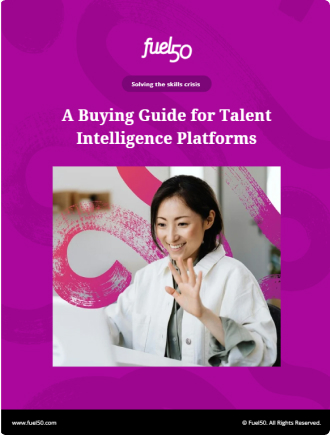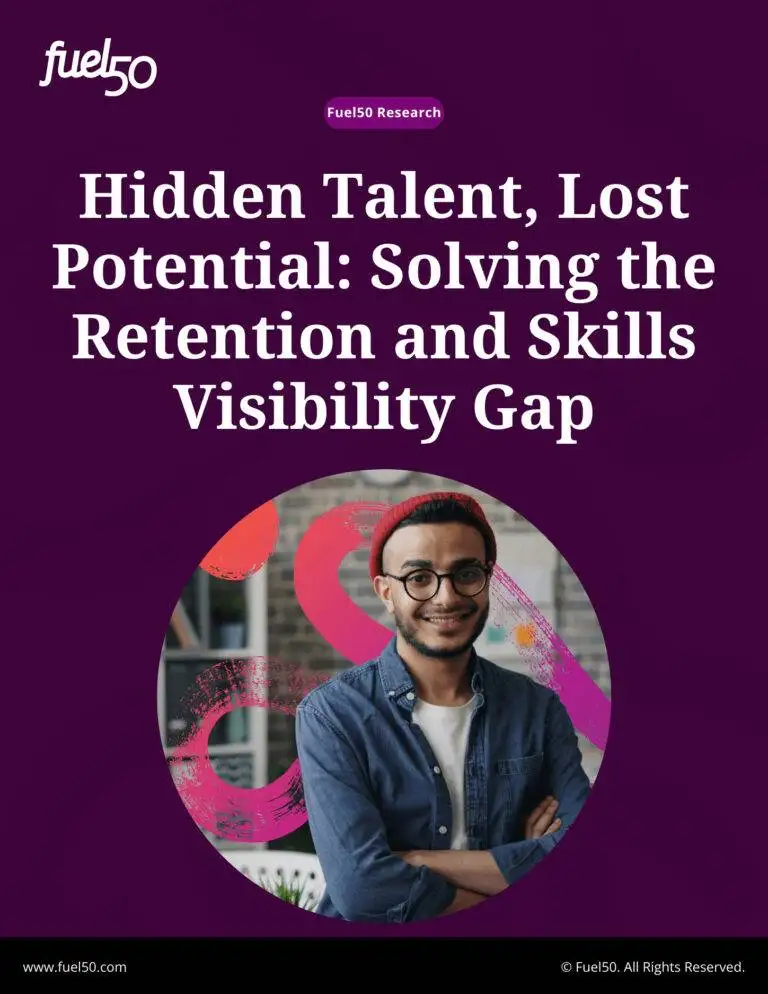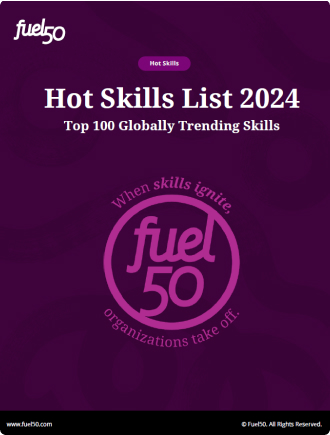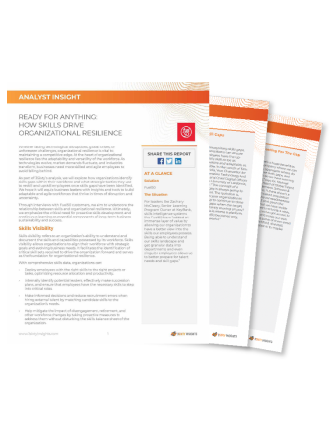In 2016, IBM, with over 350,000 employees worldwide, was struggling to keep pace with rapidly evolving skill requirements in the tech industry. Traditional methods of talent management were proving inefficient in addressing this skills gap.
Nickle LaMoreaux, IBM’s Chief Human Resources Officer, described the situation: “They say necessity is the mother of invention, and that’s essentially where we found ourselves about 10 years ago. We were staring at a shortage of skilled tech employees, the half-life of skills is shortening, and two-thirds of the U.S. adult population doesn’t have a bachelor’s degree.”
This realization led to the development of IBM’s AI-powered talent platform, which would later evolve into what they call the “AI-driven Skills Academy.”
IBM’s platform went beyond simple job matching. It used artificial intelligence to analyze employees’ skills, predict future skill needs, and suggest personalized learning paths. The results were impressive: within a few years of implementation, IBM reported a 40% increase in internal job fills and a significant boost in employee retention.
According to a 2020 case study by Josh Bersin, a leading HR industry analyst, IBM’s talent marketplace enabled the company to:
- Reduce time to fill critical roles by 50%
- Increase internal mobility by 80%
- Achieve employee engagement scores in the top 10% of all companies globally
This transformation at IBM isn’t an isolated case. There are many other enterprise companies leveraging talent marketplace to future-proof their workforce.
So, what exactly is a talent marketplace, and how can it transform your organization?
What is a talent marketplace?
A talent marketplace matches people, based on their skills, core values, and motivators, to potential role moves and other career development opportunities within their organization, including learning, mentors, gigs, and projects.
Its core function is to facilitate how organizations manage their workforce and nurture employee growth. Think of it as an internal matchmaking system, connecting employees with opportunities within the company based on their skills, values, and career aspirations.
Here’s how a talent marketplace can help transform traditional talent management within the organization and help with career development for the employee:
Before talent marketplaces, if a manager needed someone with specific skills for a project, they might immediately look to hire externally. This approach often overlooked hidden talent within the organization and missed opportunities for employee development.
For example, imagine a marketing team needs someone with data analysis skills for a new campaign. Traditionally, they might post a job listing and interview external candidates. However, with a talent marketplace:
- The platform identifies an employee in other departments, like Finance, with skills interests and preferences around the new gig.
- It suggests this employee for the project, providing an opportunity for cross-departmental collaboration and career development.
- The marketing team gains a skilled team member, while the finance employee broadens their experience.
According to Josh Bersin1, “The Talent Marketplace is like a combination of career management, social networking, and recruiting system all in one. In many ways, it’s like your internal “LinkedIn” inside your company – with recruiting features, training, and mentoring all included.”
What are the business benefits of a talent marketplace?
Talent marketplaces are proven to increase employee engagement, retention, and internal talent mobility. An ai talent marketplace can support the transformation of the talent experience, resulting in improved workforce productivity and ultimately benefitting the organization’s bottom line.
Fuel50’s research2, as well as numerous external sources3, shows that it costs double the amount to hire externally than it does to invest in and build your talent pipeline internally. External hires get paid up to 20% more, and it takes almost twice as long to onboard them than an internal hire.
Aside from the recruitment cost savings, here are six key benefits of a talent marketplace:
- Better alignment with company culture: An internal talent marketplace allows for the hiring of employees who are already familiar with the company’s culture and values, which can lead to better alignment and a more positive work environment.
- Increased retention and employee engagement: By providing people with personalized opportunities for career growth and development and internal mobility, an internal talent marketplace can increase employee satisfaction and engagement, helping to reduce turnover rates and increase employee tenure.
- Improved knowledge sharing and collaboration: An internal talent marketplace can break down silos by encouraging knowledge sharing and collaboration between teams across the organization. Cultivating talent communities helps close the skills gap and ensures that if one employee is absent for a period, another with the same skills can support their workload.
- Better succession planning: An internal talent marketplace can support succession planning by enabling organizations to identify high performing and develop high-potential employees for future leadership roles.
- It fulfills immediate and long-term business needs: Short-term gaps may be able to be plugged with gigs and projects, while the talent data surfaced through a talent marketplace can inform the organization’s talent management strategy
- More impactful career conversations: Larry McAlister, former VP of Global Talent at NetApp, and a strong supporter of using a talent marketplace to develop talent, says, “Tech is getting you to the human interaction faster and with more actionable data. Precision around growth, at scale.” Armed with actionable data points, surfaced through the talent marketplace, managers can hold constructive conversations with employees on their development.
3 ways different stakeholders within your organization can leverage a talent marketplace
Contrary to popular belief, talent marketplaces aren’t just for companies, they also benefit internal stakeholders and employees.
For employees, a talent marketplace can help with career development
Talent marketplace provides employees with the tools to build their career DNA by identifying what matters to them – their aspirations, skills, core values, and motivators.
Their career DNA then feeds the specialized AI to support a hyper-personalized talent experience by suggesting relevant potential role moves and new career opportunities, where they can begin to design their career growth journey, see real-time skills gaps, set goals, and take immediate action through the talent marketplace.
A talent marketplace gives people visibility to internal career moves. It shows what skills they need to add or improve before stepping into a new role and suggests ways to close those skill gaps in real-time through learning, gigs, mentors, projects, and more, all within the talent marketplace.
In addition to career pathing, talent marketplace platforms enable employees to track their career growth with goal setting, objectives, and action plans, empowering employees with a clear sense of purpose, vision, and actionable career development steps. They also provide a place to catch and celebrate their wins and request and give feedback.
For leaders, a talent marketplace can help unveil hidden talent
Leaders use the talent marketplace to gain visibility to their talent, support short- and long-term career growth, build their teams, see retention risks, easily source the best talent for new roles, and have great career conversations with their people.
With a talent marketplace, leaders can see what talent they have and where it is in real-time. They can identify their people’s skills, career aspirations, strengths, and growth areas and then support personalized development plans to help people reach their full potential and truly love what they do at work.
A talent marketplace gives business leaders the power of talent pipeline visibility by unlocking the ability to surface insights and data quickly on their teams. Leaders can create and manage their talent pipelines, create pools of in-demand talent, and plan and organize their teams. They can find the best-fit talent for new or existing roles as they can see the skills gaps across their talent and who is most ready.
Talent marketplaces enable leaders to support workforce redeployment, re-engineering, upskilling, and reskilling by building talent pipelines to solve business challenges – squad-building, succession planning, agile redeployment, and workforce restructuring – and promote internal talent mobility across teams.
For HR professionals, a talent marketplace can help provide insights to future proof their workforce
HR teams use the talent marketplace to harness workforce insights and validated talent data to support strategic workforce decisions, future people initiatives, and organizational strategy.
With a talent marketplace, Human Resources can understand their talent and see their organization’s skills and capabilities. They can then identify what skills they have now and what they need to develop for the future. As a result, HR can give leaders and managers what they need to recruit and attract the right talent with the right skills to ensure the best fit. They can also boost retention by identifying retention risks and areas of the workforce needing attention early.
Internal mobility is an increasingly important focal point for HR teams as it has the dual benefit of increasing employee engagement and satisfaction while saving on recruitment costs. And as Richard Branson famously said, “If you look after your staff, they’ll look after your customers. It’s that simple.”
Internal hires are more likely to be a better cultural fit since they already have an inside connection to the corporate culture and know how things function. A talent marketplace speeds up the time it takes to identify new applicants since HR and leaders already have a knowledge foundation that enables them to make recruiting choices more quickly.
How are organizations using the talent marketplace?
The shift towards a skills-based approach where employees are valued for their skills rather than their job title or qualification is quickly becoming key for organizational growth and success.
The best talent marketplace supports this shift by offering better visibility into the skills you have within an organization, as well as the skills needed to operate successfully. It drives reskilling, upskilling, internal mobility and encourages the transfer of skills across the business.
It gives leaders access to diverse talent pools to be able to build talent pipelines and solve business challenges — squad-building, succession planning, agile redeployment, and workforce restructuring.
Here are some results organizations have seen from using a talent marketplace:
- KeyBank has seen a 60% increase in training and participation usage across the business, and over 2,774 upskilling and reskilling actions since implementing a talent marketplace.
- NetApp has used a talent marketplace to gain visibility into the talent and skills they already have vs. what they need to support their business transformation from a traditional data storage business to a cloud company. They are now able to pinpoint their skills gaps and deploy learning initiatives to fill them.
- Trane Technologies has increased internal mobility and recruitment from 39% to 55% with a talent marketplace.
Talent marketplace overview: What Makes a Great Talent Marketplace Platform?
A great talent marketplace platform should offer a comprehensive set of features that enhance employee development, improve organizational workforce agility, and drive business success. Here are key components that set apart the best and successful talent marketplace solutions:
Career pathing
Career pathing is a feature that allows employees to visualize and plan their potential career trajectories within the organization. It provides a clear roadmap for professional growth, showing the skills, experiences, and qualifications needed to progress to various roles.
Why it’s important:
- Supports employee engagement and retention by demonstrating long-term opportunities within the company
- Helps in closing the skills gap by clearly outlining the competencies needed for advancement
- Facilitates internal mobility support by making career options transparent
Here’s a typical example of career pathing into play.
An employee in a junior marketing role can use the career pathing tool to see potential paths to becoming a marketing manager, content strategist, or even transitioning to a related field like customer experience. The tool would show the skills needed, suggested training, and potential interim roles, creating a personalized development plan.
Mentoring
A mentoring feature in a talent marketplace platform connects employees with more experienced colleagues for guidance, knowledge sharing, and support. It facilitates relationships that foster professional growth and transfer of institutional knowledge.
Why it’s important:
- Encourages a growth mindset and supports experiential learning
- Enhances employee engagement through meaningful professional relationships
- Helps retain and develop top talent within the organization
Here’s a typical example of the mentoring feature in a talent marketplace platform into play.
A new product manager could be matched with a senior manager from a different department, providing fresh perspectives and cross-functional insights. The platform could suggest matches based on skills, career goals, and even personality traits to ensure a good fit.
Project and gig marketplace
This feature allows employees to find and apply for short-term projects, assignments, or ‘gigs’ within the organization, outside of their regular roles. It creates an internal talent marketplace where skills can be shared across departments.
Why it’s important:
- Provides opportunities for employees to gain new skills and experiences
- Increases organizational agility by allowing flexible allocation of talent
- Supports internal mobility and cross-departmental collaboration
Here’s a typical example of a gig marketplace into play.
An IT specialist might take on a two-week project in the marketing department to help with a technical aspect of a campaign launch. This gives the IT specialist exposure to marketing processes while providing the marketing team with valuable technical expertise.
Skills architecture
Skills architecture is the underlying framework that defines, categorizes, and relates various skills within the organization. It creates a common language for discussing and assessing competencies across the company.
Why it’s important:
- Provides a foundation for accurate skill matching and gap analysis
- Enables consistent evaluation and development of talent across the organization
- Supports strategic workforce planning and helps in creating an agile workforce
Here’s a typical example of skills architecture into play.
A comprehensive skills architecture might categorize “data analysis” into subcategories like “statistical analysis,” “data visualization,” and “machine learning,” each with defined proficiency levels. This granularity allows for precise matching of talent to opportunities and targeted skill development.
Internal mobility
Internal mobility features support the movement of employees between roles within the organization, whether it’s a promotion, lateral move, or complete career change. It encompasses tools for finding internal opportunities, applying, and transitioning between roles.
Why it’s important:
- Retains top talent by providing growth opportunities within the company
- Reduces talent acquisition costs and time-to-productivity for new roles
- Enhances employee engagement and job satisfaction
Here’s a typical example of internal pathing into play.
An accountant interested in moving into a business analyst role could use the internal mobility tools to find relevant openings, understand the required qualifications, and even connect with current analysts to learn more about the role. The system could also notify them of relevant opportunities based on their expressed interests and skills.
5 ways to implement a talent marketplace within your organization
It is important that an organization’s talent marketplace strategies are properly defined before implementation. Deloitte offers some valuable tips on how to build an effective talent marketplace.4
- Make sure you determine the purpose of your talent marketplace platform. What are your goals? What do you hope to accomplish? How will you measure success? What are your goals? Consider the purpose behind your talent marketplace implementation.
- Factor in the future of work. The future of work is now. In the last two years, the way the world works has changed more drastically than ever. And with more employees quitting their jobs more than ever, the future of work must continue to evolve.What does your future work strategy look like? How will the talent marketplace work with your future work strategy?
- Choose the right platform that works for your organization. We know there are plenty of talent marketplace platforms out there. HR professionals, reach out to your networks to see what’s worked well for peers in your space. It’s important the tool fits your needs and can stay agile as your organization grows.
- Engage and educate managers. Your people managers will play a critical role in the success of your talent marketplace. Why? Your people managers need to be champions of career mobility. Managers need to understand the value proposition of a talent marketplace. They also need to be aware of the long-term benefits and bigger vision.Ideally, when you roll out a talent marketplace program, you also roll out manager training. Frequent internal communication about the program, its goals, and why it’s important is critical. Make sure you’re supporting your managers through this journey. You can also provide extra resources, like access to personalized coaching, that can help.
- Spread awareness among employees. Employees need to know that the talent marketplace works — and works for them. Educate your employees about the talent marketplace. Share success stories to help drive engagement in the program. Make sure it’s easy for employees to access the talent marketplace. Listen to their feedback, and make sure the process is iterative. Similar to hiring managers, individual contributors need training and awareness. They also need support. Many people might not know what direction they’d like to take in their careers. They might need help picking a gig that’ll fit their career aspirations. Or they might need a coach to help them figure out their strengths and opportunities.
Final thoughts on talent marketplaces and a case for Fuel50
While the benefits of talent marketplaces are clear, implementing one successfully requires careful consideration and the right partner. This is where Fuel50 stands out as a leader in the field.
Fuel50’s talent marketplace solution goes beyond simple skill matching. It nurtures and serves the whole employee, considering not just their skills, but their aspirations, potential, and personal growth. This holistic approach is crucial in today’s landscape where there’s an ever-shifting employee expectations and the fiercest competition for talent demands innovative solutions.
What sets Fuel50 apart is its comprehensive ecosystem:
- AI-Driven Career DNA: Fuel50’s platform creates a unique “career DNA” for each employee, ensuring every interaction and opportunity is tailored to their individual profile.
- Skills Architecture: Fuel50’s Skills Ontology provides a dynamic, AI-updated library of capabilities, creating a unified language for talent across your organization.
- Mobility: The platform doesn’t just show open positions; it creates clear pathways for career development and mobility, addressing the critical need for closing the skills gap.
- Gigs: Fuel50 facilitates experiential learning through short-term projects and assignments, fostering an agile workforce.
- Data-Driven Insights: With Fuel50 Insights, HR teams gain actionable intelligence for strategic workforce planning.
Moreover, Fuel50’s commitment to continuous innovation ensures that the platform evolves with your organization’s needs.
As Josh Bersin noted, “Companies that have better talent marketplaces are outperforming their peers.” Fuel50 is at the forefront of this performance-driving technology.
Implementing a talent marketplace system may require initial investment, but with Fuel50, the returns — both financial and cultural — are substantial and swift. Increased employee engagement, improved retention, and enhanced internal mobility are just the beginning.


















